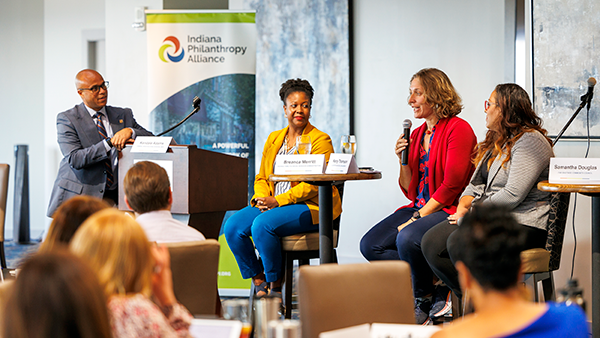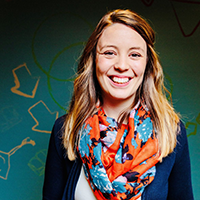Mutz Class Learns the Value of Inclusive Leadership

This blog was written by Kami Nielsen, senior program officer at Richard M. Fairbanks Foundation, to provide an inside look into her Mutz Philanthropic Leadership Institute class.
During my time in the Mutz Philanthropic Leadership Institute, I've learned many different approaches to philanthropy, examined the roles of philanthropy in public policy, and explored case studies of communities, organizations, and funders who are collaborating on innovative solutions to tough issues. I think our August session about inclusive leadership, however, was the most important one yet. During the session, we primarily addressed two questions: 'What is inclusive leadership?' and 'What is philanthropy's role in fostering inclusive communities?'
What is Inclusive Leadership?
Aaron Eckhardt, principal partner and founder of EckCo, facilitated the day's events. Eckhardt shared a journey to DEI consulting and leadership consulting, coming to the realization that too often we ask people hide pieces of their identity and culture that are most important to them. This leads to inauthentic relationships and environments that are not always welcoming or inclusive. "Inclusive leadership means matching the work you are doing [as an organization] to the needs and culture of the community, not the other way around," Eckhardt said.
"Inclusive leadership means matching the work you are doing [as an organization] to the needs and culture of the community, not the other way around." - Aaron Eckhardt
To lead inclusively, a person must consider the intersectional experiences and identities of those with whom they interact, and work to ensure the creation of an environment where everyone has the resources they need and an opportunity to succeed. As funders and nonprofit leaderships, we must all recognize the immense privilege we have (as measured by our proximity to power and decision-making) and use that privilege and power to advance inclusivity.
How is Philanthropy Using Its Power to Promote Inclusivity & Advance Racial Equity?
The next session featured a panel of serveral incredible philanthropic leaders working to advance racial equity: Darryl Lockett, executive director of the Kennedy King Memorial Initiative; Pamela Ross, vice president of opportunity, equity, and inclusion at the Indianapolis Foundation/Central Indiana Community Foundation; Willis Bright Jr., co-director of the Indianapolis African American Quality of Life Initiative; and Danielle Neveles, senior director of social impact at Eli Lilly & Company Foundation.
Because the policies, practices, and attitudes that define our systems were designed to perpetuate the belief that non-white individuals were somehow 'less than' and were therefore undeserving of the same access and opportunity, racial inequity exists in nearly every system in which we operate as a society. Dismantling these systems will require a dramatic power shift and will take intentional and sustained effort by those with power, including those in philanthropy.
Funders have inherent power, the panelists emphasized, and should constantly access how they use that power to make change. This requires building trust among communities, which requires leading with more than money; it requires a high-touch relationship and support beyond the initial grant.
What Do Community Leaders Focused on Advancing Equity & Economic Mobility Need?
The next panel focused on what inclusive leadership looks like in action. The panel, moderated by Kendale Adams, deputy chief of criminal investigations with the Indianapolis Metropolitan Police Department, included Breanca Merritt, chief health equity and ADA officer at Indiana Family and Social Services Administration; Kerry Thomson, executive director of the IU Center for Rural Engagement; Samantha Douglas, president of the Far Eastside Community Council; and Tony Kirkland, executive director at City of Evansville Indiana Metropolitan Evansville Transit System (METS).
"Basic necessities are just the first step in the process. We must change hearts and minds." - Samantha Douglas
They shared the challenges individuals must overcome to achieve financial stability and how nonprofit and community leaders face a relentless uphill battle to support them in overcoming those barriers. "We put so much pressure on nonprofits to do the heavy lifting of what used to be a very communal and governmental issue," Kerry Thomson said. "If you can't break through the policy barriers on things like transportation and housing, upward mobility is nearly impossible."
Samantha Douglas agreed. "We can give people all the resources in the world, but we have to address the root causes of trauma and mental health challenges," she said. "Basic necessities are just the first step in the process. We must change hearts and minds."
The group had a broader discussion on how mentorship and consistent, one-on-one relationships are often the most effective way to supporting an individual. The panelists challenged the funders in the room to understand that scalability isn’t always the best goal; we have to find ways to support the individual programs and people who are doing the work.
How One Parent Has the Power to Drive Systemic Change
Over lunch, we had the privilege of hearing from Bernita Bradley in a conversation moderated by EdChoice President & CEO Robert Enlow. Bradley is first and foremost a mom, but also the founder of The Village and Engaged Detroit. She did not always consider herself an activist or a champion for education equity, but she has found herself a leader in this work.
“Ask the people doing the work what they need. Then go fund them to do that work.” - Bernita Bradley
Her story demonstrates that parents have agency and together parents have the power to disrupt systems to ensure all students have the opportunity to learn, play, and thrive. Bradley’s challenge to philanthropy was simple: trust parents and the community leaders on the ground. “Ask the people doing the work what they need," she said. "Then go fund them to do that work.”
Inclusive Leadership is People-Centered Leadership
To wrap up, we heard from a panel of philanthropy and nonprofit leaders intentionally focused on building inclusive, people-centered communities: Guadalupe Pimantel Solano, community leadership officer at the Indianapolis Foundation; Patti Hays, CEO of the AWS Foundation; Gregg Keesling, president of RecycleForce; and Jeannie Infante Sager, director of the Women’s Philanthropy Institute at the IU Lilly Family School of Philanthropy.
The panelists agreed that, at its heart, being people-centered is a commitment to building relationships, understanding the value of the human experience, and recognizing and confronting biases. Being a people-centered inclusive leader means ensuring everyone has a seat at the table and all people receive the attention and resources they need to move forward.
As leaders in the philanthropic community, the panelists encouraged the 2022 Mutz cohort to work alongside communities, to meet organizations and individuals where they are, and to create welcoming environments in which people feel that they can share challenges and feedback, in addition to progress and successes.
Reflecting back on the day, our class identified several overarching themes that we will take back with us to our day-to day work: active and authentic listening; building relationships and trust with grantees and community leaders; providing support beyond the money; leaning into discomfort to challenge biases and shift power; and leading with your core values.




